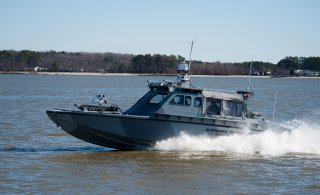U.S. Navy Drone Boats May Change the Naval Equation in Ukraine
Underwater surface vehicles could perform forward targeting missions for coastal weapons such as anti-ship missiles.
Drone boats are heading to the shores of Ukraine to defend port cities and key coastal areas from further Russian attacks, a significant development given that Russia has already once launched an amphibious attack. Limited details regarding U.S. military aid are available for security reasons, however, the Pentagon has confirmed that Unmanned Surface Vessels (USV)are being sent to Ukraine.
“They're designed to help Ukraine with its coastal defense needs. And I think I'm just going to leave it at that. I'm not going to get into the specific capabilities, but they're designed to help Ukraine with its coastal defense needs,” Pentagon press secretary John Kirby told reporters on April 14.
The known performance capabilities of these small drone boats make this a major development for Ukraine’s defense efforts as the war shifts into a new phase. It is unclear just how sophisticated they will be in terms of autonomy, but at the very least they can be operated remotely by Ukrainian forces conducting command and control from the shore. Beyond this, they may operate with various levels of autonomy, bringing a range of unrivaled tactical advantages. USVs, whether armed or unarmed, can perform both offensive and defensive roles.
In terms of defensive operations, USVs could offer Ukrainian forces along the coastline a beyond the horizon surveillance tool to sense, see, and detect approaching Russian ships and even provide early warning of an amphibious attack. This could be crucial, as it would allow Ukrainian ground forces to consolidate defenses and mass firepower along the coast to target approaching Russian ships. The USV drone boats could share data and possibly even stream real-time sensor video between one another and back to Ukrainians performing command and control on the shore. Should Ukrainians know the location of attacking Russian ships, they could effectively target them from shore or launch aircraft to attack them.
At the same time, the USVs might offer an equal or better opportunity to conduct offensive operations. More specifically, they could perform forward targeting missions for coastal weapons such as anti-ship missiles. If the Moskva, the sunk Russian flagship, was in fact destroyed by some kind of Ukrainian anti-ship missile, then having forward operating USVs miles away could help pinpoint Russian ships for attack from beyond the visible horizon. Pentagon officials have confirmed that the Moskva was struck by a Ukrainian missile. While this development may or may not be related to the successful attack on the Russian ship, the timing does appear significant.
There certainly is reason to believe that the Ukrainian coastline along the Black Sea and the Sea of Azov continue to be at great risk due to the range of Russia’s ship-fired weapons and the Ukrainian Navy being essentially a nonfactor. Furthermore, Kirby noted that “they have blockaded Odessa. Clearly, they have prevented Odessa from economic, trade, and flow of maritime traffic in and out of Odessa. But I'm not aware of anything they've done to threaten or to pose a problem for the economies of other Black Sea nations.”
It would make sense that Russian forces might wish to be careful along other coastal areas of the Black Sea, given that NATO-allied Romania and Bulgaria border the Black Sea just south of Odessa. This is quite significant because, despite Putin’s inflammatory rhetoric about NATO and the West, he does seem to be making a clear effort not to provoke NATO directly.
Kris Osborn is the Defense Editor for the National Interest. Osborn previously served at the Pentagon as a Highly Qualified Expert with the Office of the Assistant Secretary of the Army—Acquisition, Logistics & Technology. Osborn has also worked as an anchor and on-air military specialist at national TV networks. He has appeared as a guest military expert on Fox News, MSNBC, The Military Channel, and The History Channel. He also has a Master’s Degree in Comparative Literature from Columbia University.
Image: U.S. Navy/Flickr.

